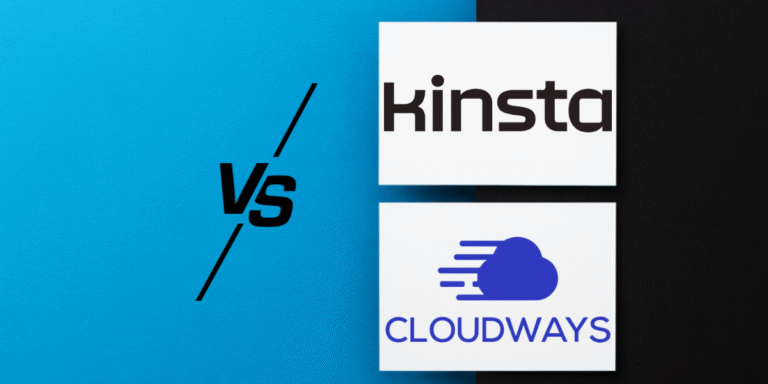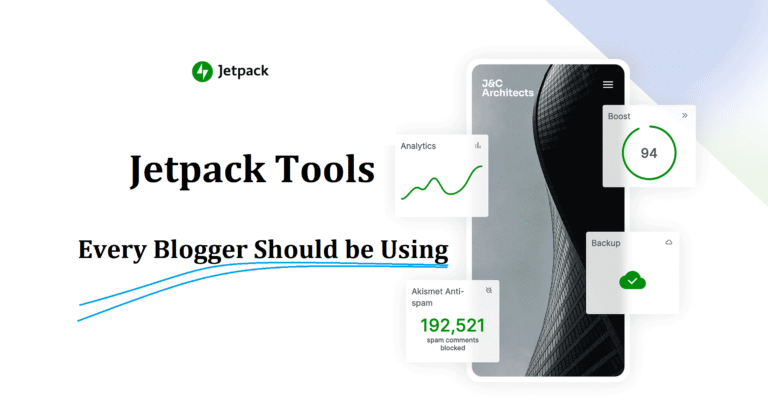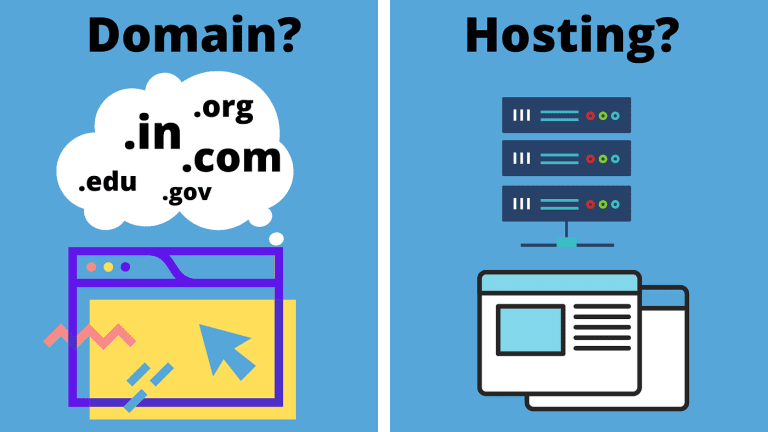Best WordPress Hosting for Creators 2026 (Tested & Ranked)
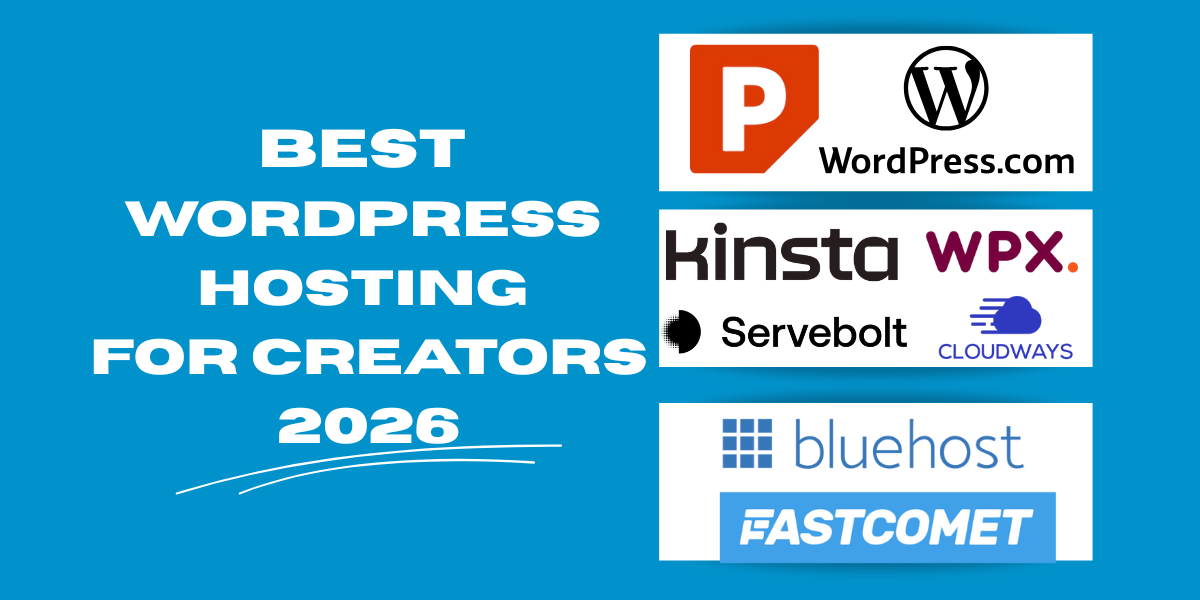
Quick Take:
After testing 15+ hosting providers and managing sites across different platforms since 2018, WordPress hosting in 2026 is split between two camps: managed powerhouses that cost a premium but save your sanity, and shared hosts that’ll work until they don’t.
Your wallet and stress levels will thank you for reading this.
Disclosure: This article is sponsored by WordPress.com, but every opinion here is mine. I’ve personally used these hosts, some brilliantly, some… let’s just say I learned expensive lessons.
Why I’m Writing This
Best WordPress hosting for creators and small businesses comes down to understanding what you actually need versus what hosting companies sell you.
It was a regular Saturday early this year when a client site went down during a product launch. Three hours of lost sales. Four support tickets. Zero helpful responses.
That’s when I stopped believing in “unlimited everything” promises and started deeply testing hosts.
Look, I’m gonna be real with you; choosing WordPress hosting in 2026 isn’t about finding the cheapest option with the fanciest marketing. It’s about matching your actual needs with what these companies actually deliver when shit hits the fan at 3 AM.
Shared vs Managed: Know The Difference
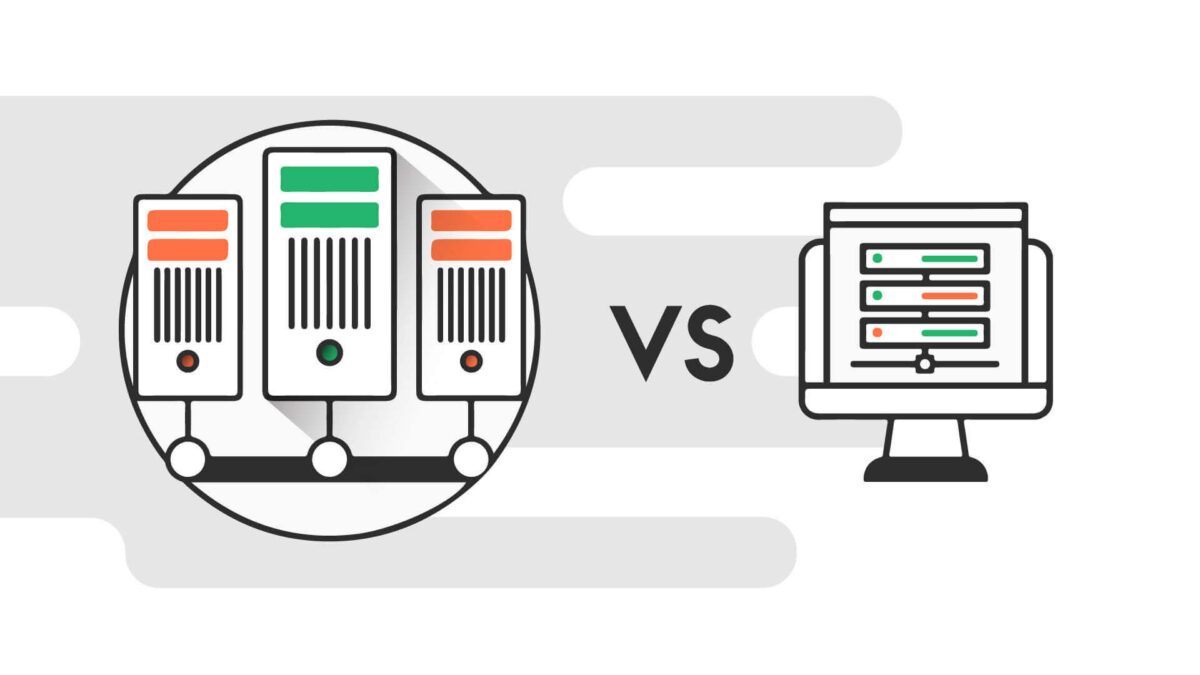
Shared Hosting = Your site shares server resources with dozens (sometimes hundreds) of other websites. Think college dorm, affordable, but your neighbor’s party might crash your vibe.
Managed WordPress Hosting = Dedicated resources, WordPress-specific optimizations, expert support who actually know WordPress. Think private apartment with a concierge who fixes things.
The price difference? Roughly $5-10/month versus $25-100/month.
The peace-of-mind difference? Priceless when you’re not crying over a crashed site during Black Friday.
Best Managed WordPress Hosting
1. Pressable

Starting Price: $25/month (1 site)
Best For: Agencies, freelancers, and anyone managing multiple client sites
Pressable runs on Automattic’s WP Cloud (the same folks behind WordPress.com), which means these individuals literally live and breathe WordPress.
What I Love:
- 100% uptime guarantee with automatic failover (your site switches servers if one fails)
- Free Jetpack Security Daily on all plans
- Free migrations handled by their team
- Staging environments that actually work smoothly
- 28+ global data centers via CDN
Here’s the Catch:
- No email hosting (use Google Workspace or similar)
- Pricing adds up if you need high traffic plans
Plans Breakdown:
- Signature 1: $20.83/mo (billed annually) – 1 site, 20 GB storage, 30K visits
- Signature 3: $50/mo (billed annually) – 5 sites, 35 GB storage, 75K visits
- Signature 5: $129.17/mo (billed annually) – 20 sites, 80 GB storage, 400K visits
- Signature 8: $562.50/mo (billed annually) – 100 sites, 325 GB storage, 2M visits
Personal story: I migrated a client’s portfolio site here last year. The migration took 4 hours, zero downtime, and their site loaded 2.3 seconds faster. The client noticed. Their bounce rate dropped by 18%.
2. WordPress.com
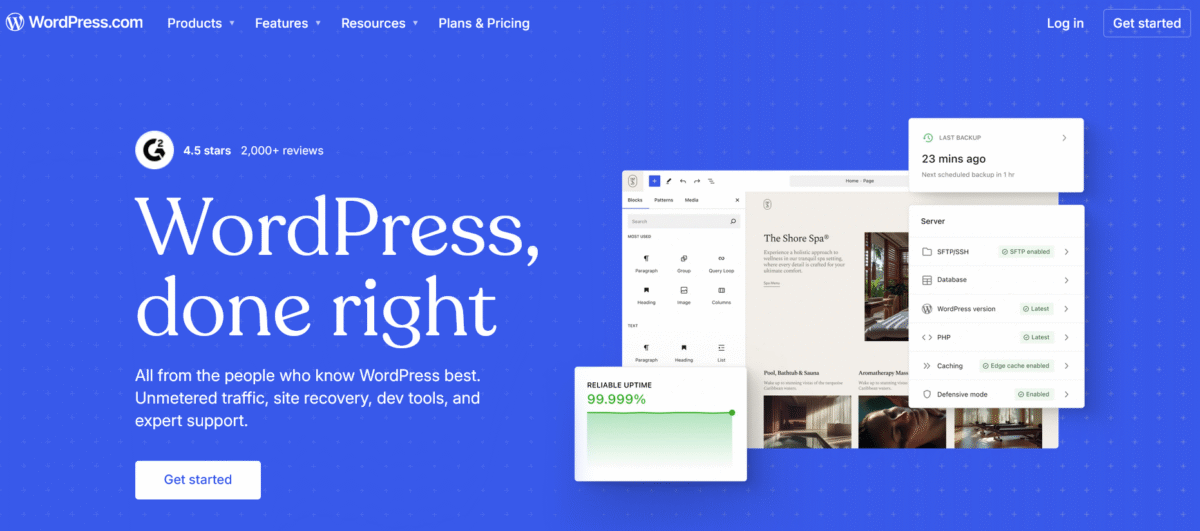
Starting Price: $9/month
Best For: Beginners, bloggers, and small businesses wanting simplicity
Black Friday 2025: Check current deals
WordPress.com isn’t just a hosting provider; it’s the actual WordPress team’s managed solution. This is like getting advice from the chef who invented the recipe.
What Makes It Special:
- Dead simple setup (seriously, my 50-year-old mom would set up her blog)
- Automatic WordPress updates and security
- Free domain for the first year on annual plans
- Jetpack integrated from the start
- WordAds monetization program
The Catch:
- Plugin access limited to Business plan ($25/mo) and up
- Theme customization is limited on the lower tiers
- WooCommerce fees: 2-3% on transactions
Plans Worth Considering:
- Personal: $4/month – Custom domain, ad-free site, basic design tools.
- Premium: $8/month – Premium themes, Google Analytics integration, monetization options.
- Business: $25/month – Full plugin and theme access, advanced SEO tools, Google My Business integration.
- Commerce: $45/month – WooCommerce integration, premium extensions, unlimited products, advanced store management.
- Enterprise: Starting at $25,000/year – High-performance hosting, enterprise-grade security, dedicated support, and scalable infrastructure for large publishers and businesses.
Last month, Marie (my business bestie) launched her consulting site on WordPress.com Business plan. Cost her less than three whiskey sours at our favorite spot, and she was live in under 2 hours. No developer needed.
3. WPX Hosting
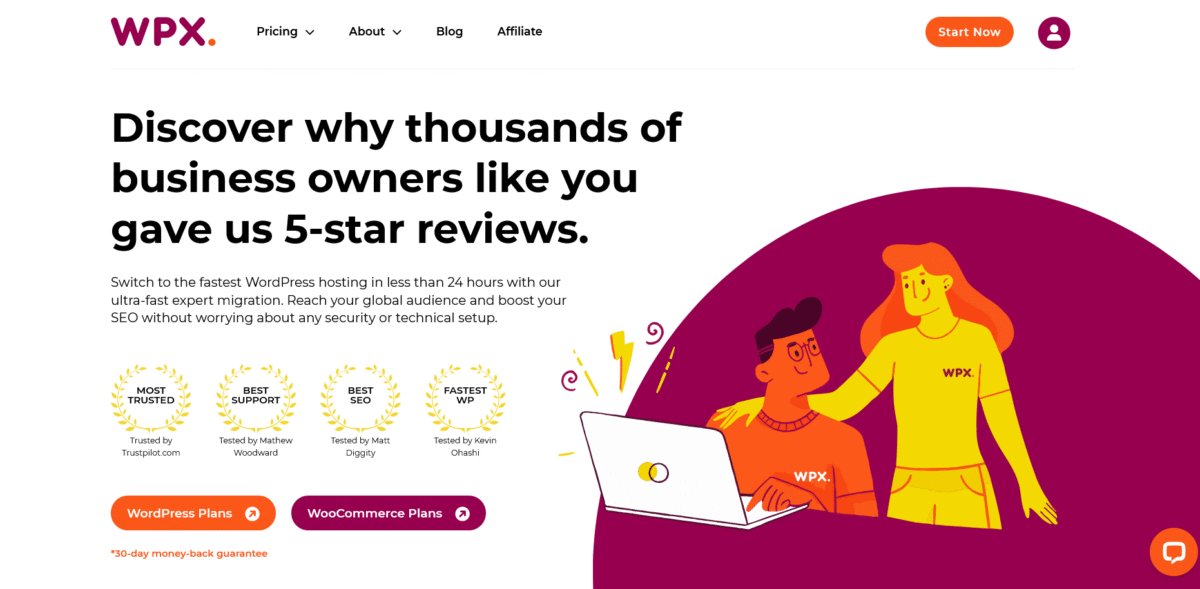
Starting Price: $20.83/month (billed annually)
Best For: Speed freaks, multi-site owners, support junkies
Black Friday 2025: 2 months free on annual plans
I’ve been with WPX for a long time. Their average support response time? Under 30 seconds. Yeah, you read that right.
Why WPX Makes Me Happy:
- Custom CDN with 33 global endpoints (FREE)
- Unlimited free site migrations
- Daily backups with 28-day retention
- Free malware removal and site fixes
- DDoS protection included
- Free business email (unlimited accounts)
The Downsides:
- No free domain
- Custom dashboard instead of cPanel (takes getting used to)
- Only 3 data center locations (USA, UK, Australia)
Pricing:
- Business: $24.99/mo – 5 sites, 15GB storage, 200GB bandwidth
- Professional: $49.99/mo – 15 sites, 30GB storage, 400GB bandwidth
- Elite: $99/mo – 35 sites, 60GB storage, unlimited bandwidth
Real talk: When my site got hit with malware last year (thanks to a shady plugin I shouldn’t have installed), WPX cleaned it up in 47 minutes. Free. That’s the kind of support that keeps me here.
Check WPX Hosting Black Friday Deal →
4. Kinsta
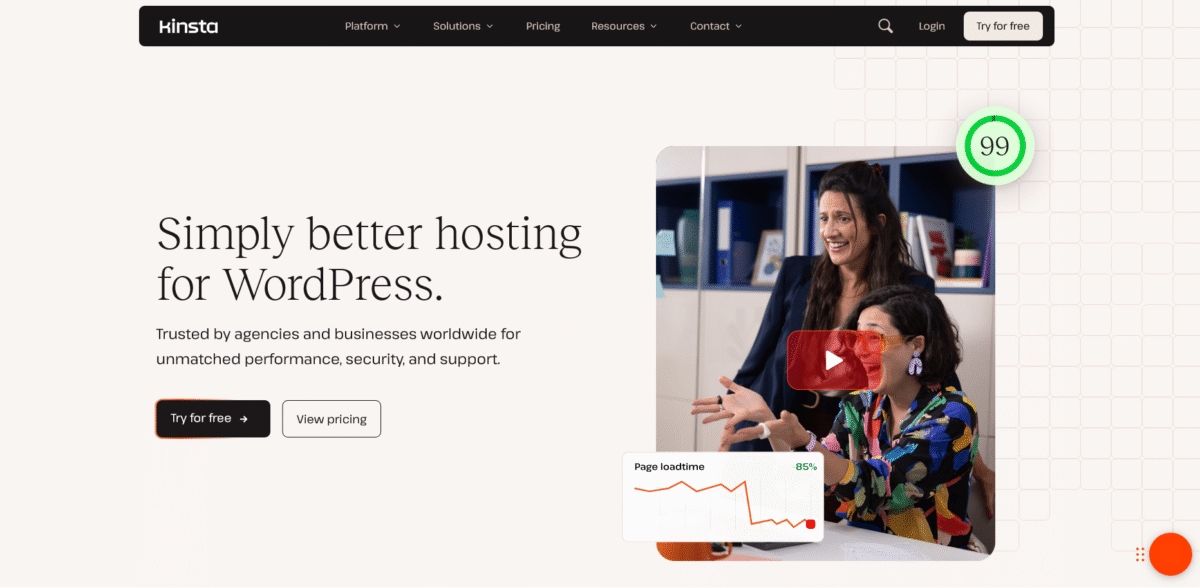
Starting Price: $35/month | $0 for the first Month
Best For: High-traffic sites, WooCommerce stores, agencies with deep pockets
Black Friday 2025: See Deals
Kinsta runs on Google Cloud Platform’s premium tier. It’s expensive. It’s also stupid fast.
The Good Stuff:
- Google Cloud infrastructure
- Free Cloudflare Enterprise CDN (200+ locations)
- Daily automatic backups
- Staging with one-click deployment
- 99.9% uptime guarantee
- DevKinsta for local development
- Free unlimited migrations
The Price You Pay:
- Most expensive option here
- Only 1 site on the starter plan
- No email hosting
- Learning curve with a custom dashboard
Plans:
- Starter (Single-Site): ~$35/month — 1 site, ~10 GB storage, ~35,000 visits/month
- Multiple-Sites (“WP 2” etc.): ~$70/month — 2+ sites, ~20 GB storage, ~70,000 visits/month
- Agency (for multiple client sites): Starting at ~$340/month (~$284/month when billed annually) — supports ~20 WordPress installs, ~50 GB storage, ~500,000 visits/month
I tested Kinsta for a client’s WooCommerce store last Black Friday. During a traffic spike (12K concurrent users), response time averaged 27ms.
Not a single timeout. Worth every penny for high-stakes situations.
Get Kinsta Black Friday Deals Now →
5. Nexcess (Liquid Web)
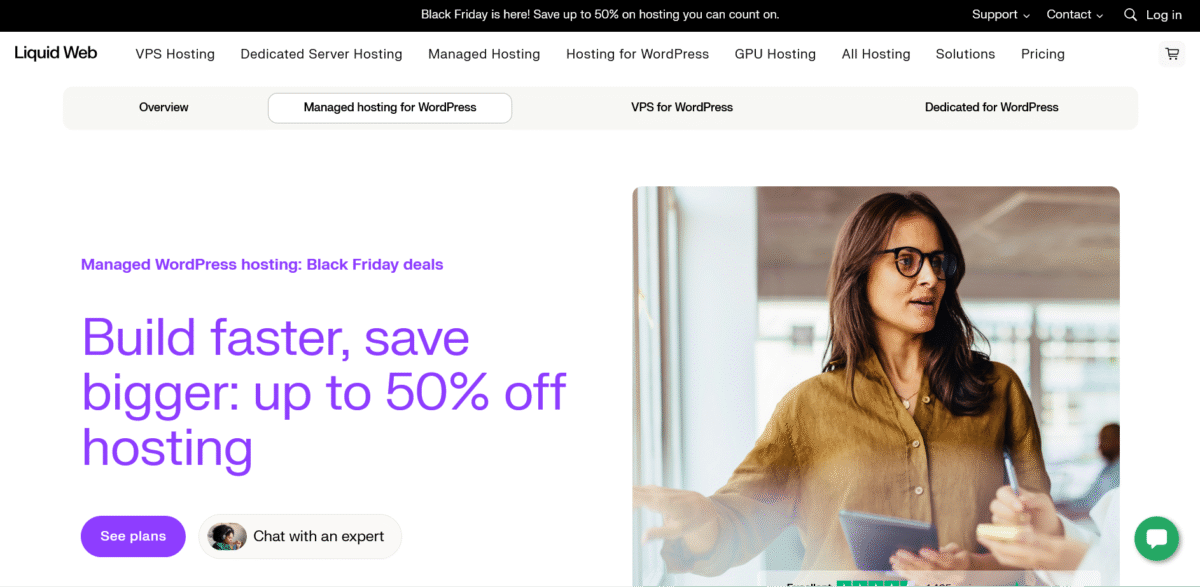
Starting Price: $6/month
Best For: WooCommerce stores, WordPress sites needing auto-scaling
Black Friday 2025: Check for seasonal deals (up to 50% OFF)
Nexcess is the WooCommerce whisperer. Owned by Liquid Web, they’ve specialized in WordPress and eCommerce for years.
Standout Features:
- Auto-scaling for PHP workers (handles traffic spikes like a boss)
- Free unlimited email hosting
- Premium plugins included (iThemes Security Pro, Astra Pro)
- Automatic image compression
- 100% uptime SLA
- Integrated CDN
- Free malware removal
The Meh Parts:
- Support can be hit or miss
- CDN is not as robust as Cloudflare
- Pricing jumps quickly with higher plans
Plans:
- Starter / Spark: $24 / month – 1 site, 15 GB storage, 2 TB bandwidth
- Maker: $48 / month – 5 sites, 40 GB storage, 3 TB bandwidth
- Builder: $74 / month – 10 sites, 60 GB storage, 4 TB bandwidth
Personal win: Migrated a jewelry store here. Auto-scaling saved their ass during a viral TikTok moment, traffic jumped 400%, and the site didn’t blink.
6. Cloudways
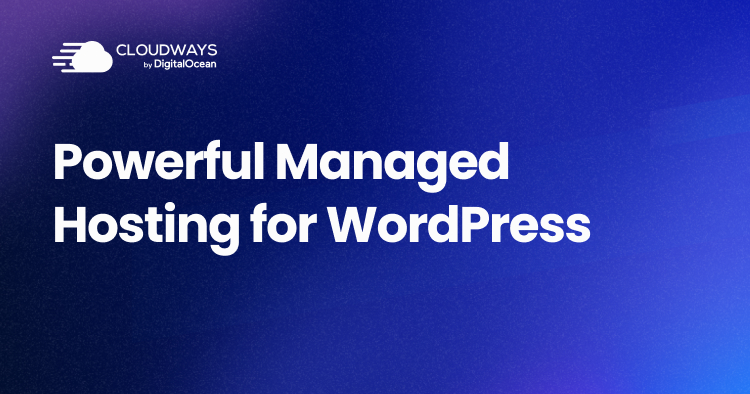
Starting Price: $11/month (DigitalOcean)
Best For: Developers, tech-savvy users wanting cloud flexibility
Black Friday 2025: Check Deals Now
Cloudways isn’t technically a host; they’re a managed cloud platform that sits on top of providers like DigitalOcean, AWS, and Google Cloud. Think of them as your cloud hosting translator.
Why Developers Love It:
- Choose your cloud provider (DigitalOcean, Linode, Vultr, AWS, Google Cloud)
- 65+ data center locations
- Pay-as-you-grow pricing
- Staging environment
- Free SSL
- Breeze cache plugin
- Team collaboration features
The Catches:
- No email hosting whatsoever
- First-time setup can be confusing
- Support quality varies
- You manage server configurations
Pricing Examples:
- DigitalOcean: Starting $11/mo
- Linode: Starting $12/mo
- Vultr: Starting $11/mo
- AWS: Starting $36.51/mo
- Google Cloud: Starting $33.18/mo
I used Cloudways for two years. Loved the flexibility and server control. Left because managing configurations started eating into client work time. Great if you’re technical, overwhelming if you just want to blog.
Try Cloudways Black Friday Deals →
Best Shared WordPress Hosting
7. Bluehost
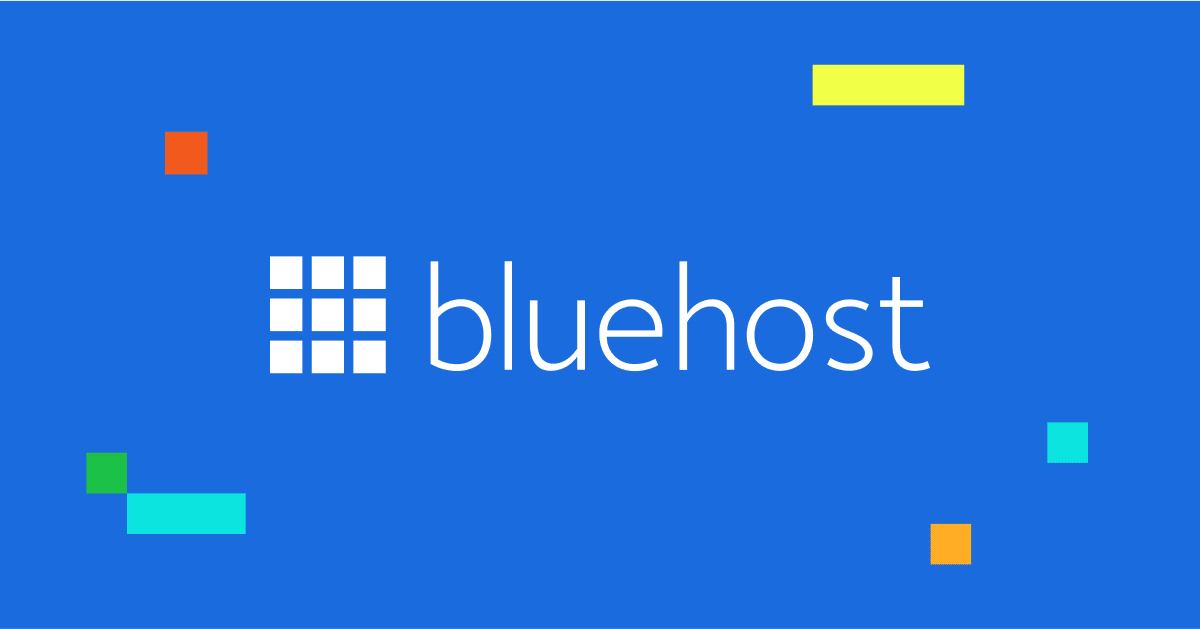
Starting Price: $3.99/month (Black Friday)
Best For: Complete beginners, first websites, tight budgets
Black Friday 2025: Check Deals Now
Bluehost is officially recommended by WordPress.org. They’re reliable for beginners, though you’ll likely outgrow them.
The Basics:
- Free domain for the first year
- Free SSL certificate
- One-click WordPress install
- 24/7 support
- Free CDN
- Automatic WordPress updates
Growing Pains:
- Performance dips with traffic growth
- Upsells everywhere
- Renewal prices jump significantly ($3.99 → $9.99+)
- Limited resources on the basic plan
Plans:
- Starter: $3.95/month (intro), $9.99/month (renewal) – 1 site, 10 GB storage, basic features
- Business: $6.99/month (intro), $13.99/month (renewal) – 1–10 sites, increased resources, backups
- eCommerce Essentials: $6.95/month (intro), $21.99/month (renewal) – multiple sites, daily backups, priority support, eCommerce features
Started my first blog on Bluehost in 2017. It was fine until I hit 5K monthly visitors, then things got slow. Perfect starter home, not your forever home.
Get Bluehost Black Friday Deal →
8. InMotion Hosting

Starting Price: $3.29/month
Best For: Small businesses, bloggers upgrading from basic shared hosting
Black Friday 2025: Check seasonal promotions
InMotion doesn’t get enough love. They’re like the reliable friend who shows up when everyone else bails.
What’s Solid:
- 99.9% uptime guarantee (they actually deliver)
- Free site transfers
- Automatic backups
- Free SSL
- BoldGrid website builder included
- cPanel access
- Faster NVMe SSD storage
Where They Fall Short:
- Not WordPress-specific optimization
- Support response times average 15-20 minutes
- Promotional pricing only for multi-year plans
Plans:
- Launch: $3.29/mo – 1 site, 100GB storage
- Power: $5.99/mo – 10 sites, unlimited storage
- Pro: $11.99/mo – 40 sites, Power + dedicated IP, more server resources
Used InMotion for a client’s local business site. Two years, zero major issues. Sometimes boring reliability is exactly what you need.
9. Fastcomet

Starting Price: $1.79/month
Best For: International audiences, budget-conscious creators
Black Friday 2025: Watch for deals
FastComet flies under the radar but delivers solid performance at bargain prices.
I published a complete Fastcomet review. Explore it and understand the host better.
The Highlights:
- 11 data center locations worldwide
- Free daily backups
- Free site transfers
- Free Cloudflare CDN
- Free domain for life (on annual plans)
- cPanel included
- 45-day money-back guarantee
The Trade-offs:
- Support quality inconsistent
- Server resources are limited on entry plans
- Renewal prices jump
- Not WordPress-specialized
Plans:
- FastCloud: $1.79/mo – 1 site, 15GB storage
- FastCloud Plus: $3.29/mo – Unlimited sites, 25GB storage
- FastCloud Extra: $5.79/mo – Unlimited sites, 35GB storage, priority support
Haven’t personally used them long-term, but three creator friends swear by them for international audiences. The multiple data centers make a difference for global reach.
10. GreenGeeks
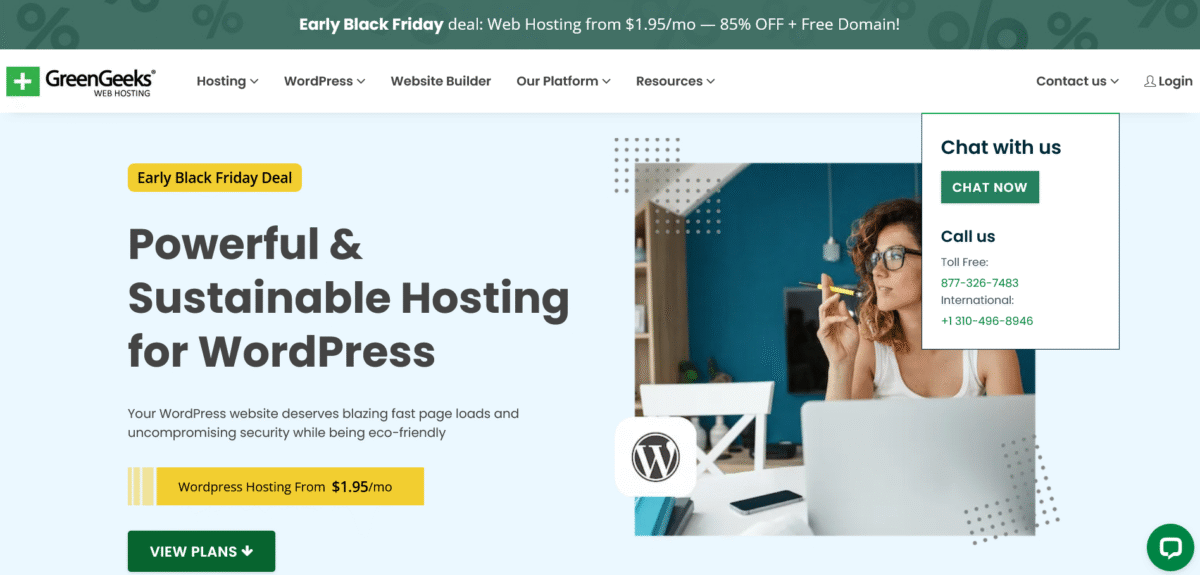
Starting Price: $1.95/month
Best For: Eco-conscious creators, beginners
Black Friday 2025: Deals available (Free Domain + Up to 85% Web Hosting)
GreenGeeks markets heavily on being “green” (300% renewable energy). The environmental angle is legit, but how’s the actual hosting?
The Green (and Good):
- Eco-friendly hosting (if that matters to you)
- Free SSL, CDN, domain, and backups
- Solid performance for the price
- cPanel access
- Decent support
- Built-in caching
Reality Check:
- Marketing oversells capabilities
- Not WordPress-specialized
- Some aggressive upselling
- Renewal prices increase
- Resource limits on basic plans
Plans:
- Lite: $2.95/mo – 1 site, unlimited web space
- Pro: $3.95/mo – Unlimited sites, 2x resources
- Premium: $5.95/mo – Unlimited sites, 4x resources
Honest opinion: They’re fine for basic WordPress sites. The eco angle is genuine (verified Green-e certification). But don’t expect managed hosting performance at shared hosting prices.
11. HostGator
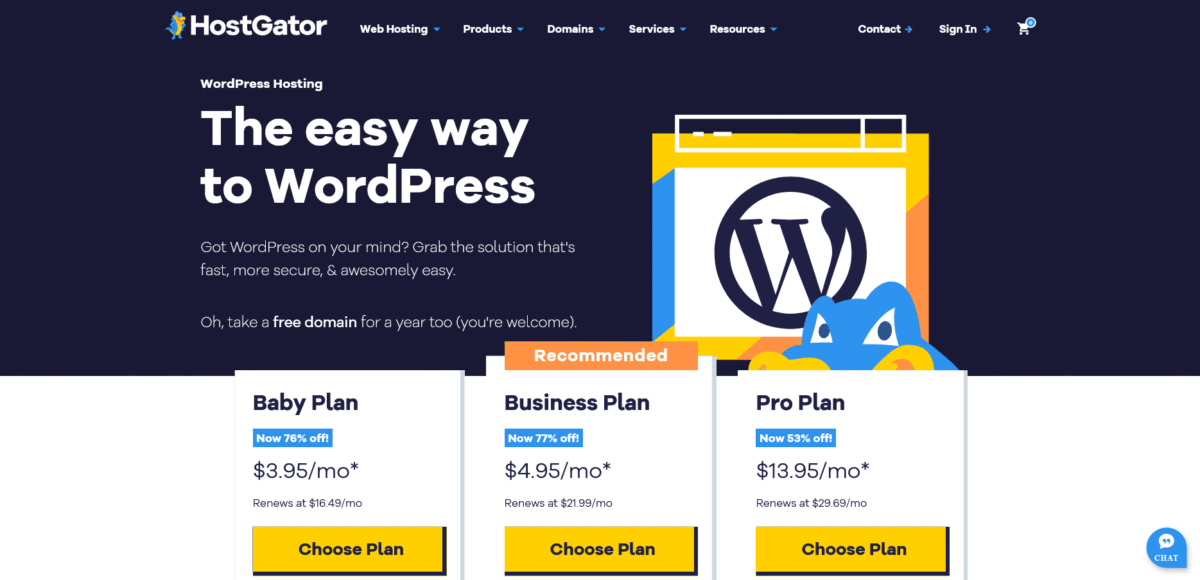
Starting Price: $3.95/month
Best For: Absolute beginners, very basic sites
Black Friday 2025: Up to 76% off hosting deals
HostGator used to be industry-leading. Now? They’re… fine. Owned by the same company as Bluehost (EIG, now known as Newfold Digital), which explains a lot.
What Still Works:
- Dirt cheap pricing
- Familiar cPanel
- Free site transfers
- Unmetered bandwidth
- 45-day money-back guarantee
What Doesn’t:
- Performance issues common
- Support quality declined
- Frequent upsells
- Server resources limited
- Not WordPress-optimized
Plans:
- Hatchling: $3.95/mo – 1 site, unmetered storage
- Baby: $4.95/mo – Unlimited sites, unmetered storage
- Business: $13.95/mo – Free dedicated IP, private SSL
I hosted a portfolio site there in 2019. It worked… until it didn’t. Frequent slowdowns, especially on weekends. You get what you pay for.
12. HostArmada

Starting Price: $2.49/month
Best For: Growing blogs, small business websites
Black Friday 2025: Check for seasonal deals
HostArmada is newer (2019) but has been making noise with solid performance at competitive prices.
The Good Stuff:
- 9 data center locations
- Free site transfers
- Daily backups free
- Free domain
- Cloudflare CDN free
- cPanel and Softaculous
- LiteSpeed caching
The Less Good:
- Limited track record (newer company)
- Support can be slow during peak times
- Some features are locked to higher plans
- Renewal price increases
Plans:
- WP Launcher: $1.99/mo – 1 site, 15GB storage
- WP Evolver: $3.29/mo – Unlimited sites, 30GB storage
- WP Speed Reaper: $3.99/mo – Unlimited sites, 40GB storage, priority support
A friend of mine moved her recipe blog there last year. She’s happy with the performance and price. Haven’t tested extensively myself, but I am in the process.
13. InterServer
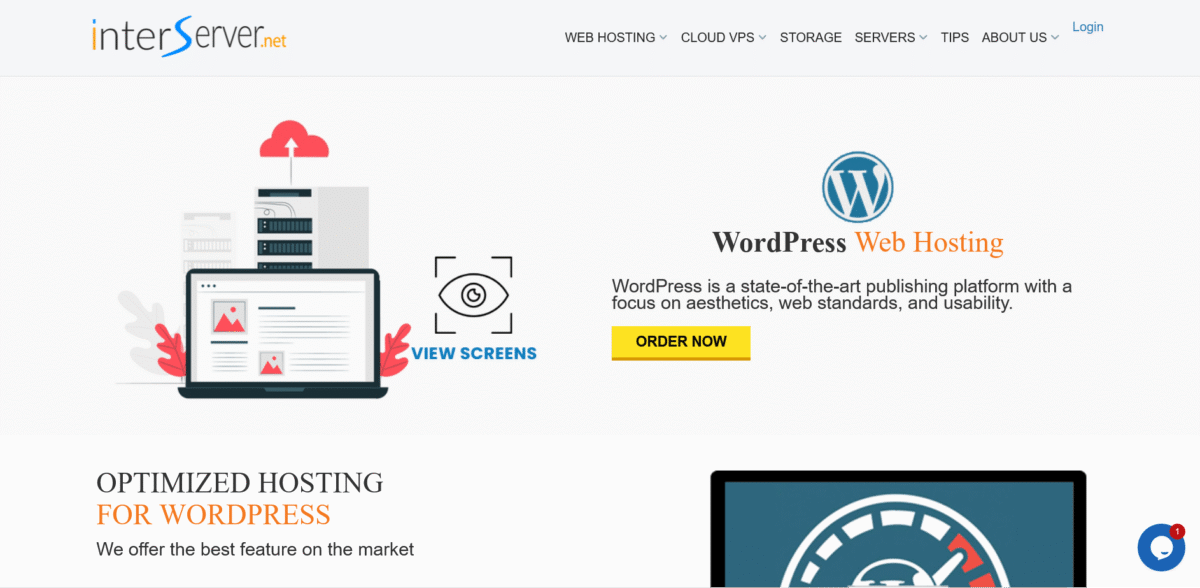
Starting Price: $2.50/month
Best For: Price-locked hosting, long-term budgeters
Black Friday 2025: Standard pricing (already locked)
InterServer’s claim to fame? Price lock guarantee. Your renewal rate stays the same. Forever.
Why That Matters:
- No renewal price surprises
- Unmetered storage, transfer
- Free site migrations
- Weekly backups
- Free Cloudflare CDN
- Stable performance
The Downsides:
- Interface feels dated
- Not WordPress-optimized
- Support is average at best
- No free domain
- Features are basic compared to competitors
Standard Pricing:
- Standard: $2.50/mo (locks at this price) – Unlimited sites, unmetered everything
The price lock is genuinely refreshing in an industry full of bait-and-switch tactics. But you’re trading features for price stability.
Premium Managed Hosts (The “My Business Depends On This” Level)
14. Liquid Web
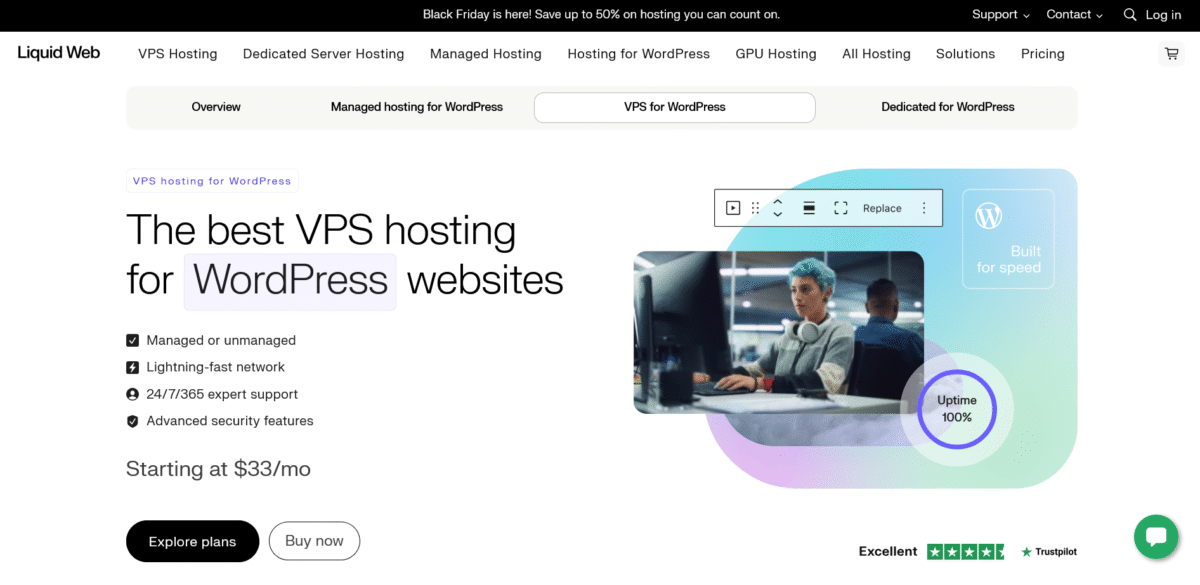
Starting Price: $33/month
Best For: Enterprise sites, mission-critical applications, agencies
Black Friday 2025: Enterprise-level custom deals | Up to 77% OFF
Liquid Web isn’t messing around. This is the “call us when everything’s on fire” tier.
Enterprise Features:
- Fully managed servers
- 100% uptime guarantee (with SLA)
- 24/7/365 phone, chat, email, ticket support
- Automatic scaling
- Advanced security (Cloudflare Enterprise)
- Dedicated account manager
- Proactive monitoring
The Investment Required:
- Starting $33/mo (VPS)
- Managed WordPress starts around $25/mo through Nexcess
- Enterprise plans can exceed $500/mo
Real story: Agency client got DDoS attacked during campaign launch. Liquid Web had it mitigated in 8 minutes. That’s why you pay premium prices.
15. Servebolt

Starting Price: €99/month
Best For: Speed obsessives, performance-critical sites
Black Friday 2025: Check deals
Servebolt is Norwegian hosting built for one thing: SPEED. They’re not kidding, their infrastructure is insane.
Speed Demon Features:
- Custom-built servers (not shared)
- Accelerated Domains (their proprietary CDN)
- Real-time cache invalidation
- HTTP/3 and Brotli compression
- Elasticsearch included
- Git deployment
- Automated scaling
Reality Check:
- Europe-based (GDPR compliant)
- More expensive than traditional hosts
- Technical setup required
- Limited support hours
Plans:
- Starter: €99/mo – 5 sites, 10GB storage, Unmetered Data Transfer
- Scale: €349/mo – 25 sites, 40GB storage, Unmetered Data Transfer
- Growth: €699/mo – 50 sites, 100GB storage, Unmetered Data Transfer
Tested for a SaaS client. TTFB averaged 40ms. Insanely fast. Worth it if speed directly impacts revenue.
16. Pressidium

Starting Price: $21-110/month
Best For: Digital agencies, enterprise WordPress
Black Friday 2025: Check deals
Pressidium caters specifically to agencies and businesses that can’t afford downtime.
Agency-Focused Features:
- 100% uptime SLA
- Staging environments
- White-label options
- Client access controls
- Priority support
- Daily backups
- Free migrations
- CDN included
Considerations:
- Higher price point
- Overage fees for traffic
- Best value at agency tier
Plans: Check Pressidium plans
Haven’t used personally, but two agency owner friends love them for client sites. The white-label options alone sold them.
17. Vodien
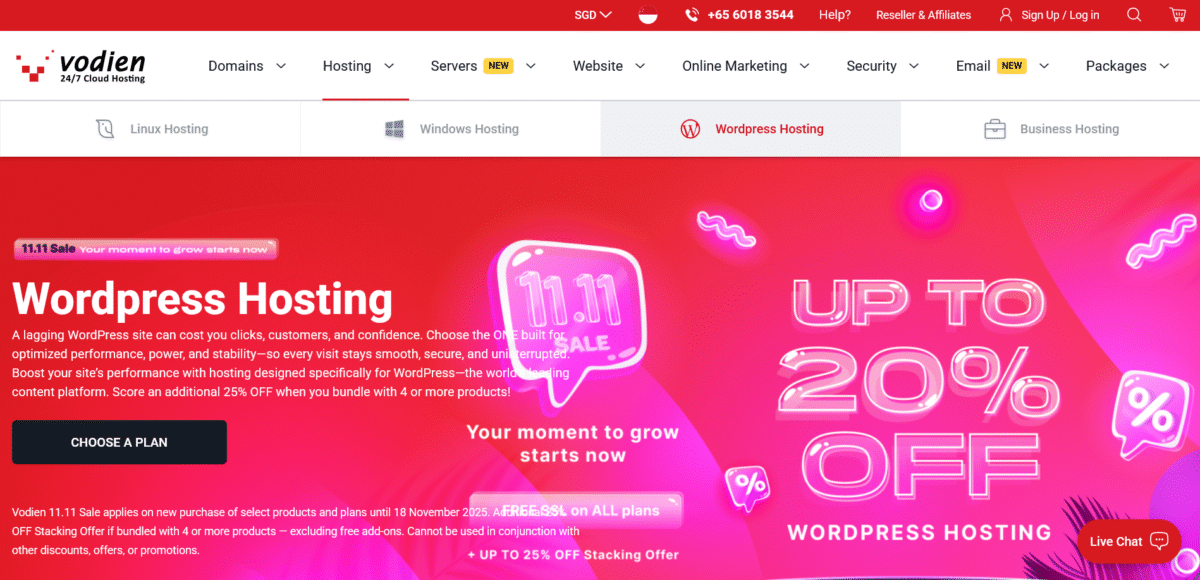
Starting Price: $8.11/month
Best For: Asia-Pacific region, Singapore-based businesses
Black Friday 2025: Regional promotions
Vodien is Singapore-based hosting with strong APAC infrastructure. If your audience is in Southeast Asia, pay attention.
Regional Advantages:
- Singapore data centers
- APAC-optimized networks
- 24/7 local support
- Free SSL certificates
- cPanel included
- Local payment options
Limitations:
- Limited global presence
- Not WordPress-specialized
- Performance varies outside Asia
- Features basic
Plans:
- Personal: $8.11/mo – 1 site, 10GB storage
- Business: $13.33/mo – 2 sites, 50GB storage
- Enterprise: $20.86/mo – 5 sites, 100GB storage
Only worth considering if your primary audience is in Southeast Asia. Otherwise, better options exist.
18. Ultahost
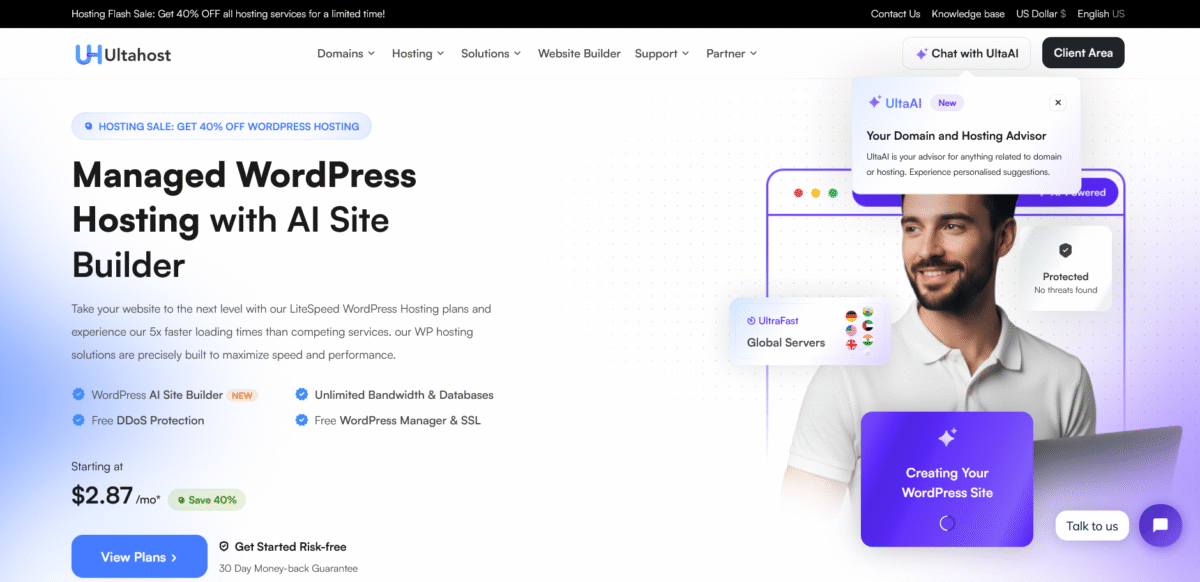
Starting Price: $2.80/month
Best For: Budget WordPress hosting, beginners
Black Friday 2025: Watch for deals
Ultahost is relatively new, competing on price with decent features.
What They Offer:
- LiteSpeed servers
- Free SSL and CDN
- Free backups
- Multiple data centers
- cPanel access
- WordPress toolkit
The Questions:
- Newer company (less track record)
- Support quality varies
- Performance under heavy load is uncertain
- Limited user reviews
Plans: Check out Ultahost pricing plans.
Haven’t tested personally. Tread carefully with newer hosting companies, wait for more user feedback.
19. Hosting.com

Starting Price: Regular $14.99/month | Start with $1 Black Friday 2025
Best For: WordPress-specific shared hosting
Black Friday 2025: Seasonal promotion
Hosting.com focuses specifically on WordPress and WooCommerce, which is refreshing.
WordPress-Specific:
- Optimized WordPress stack
- Automatic WordPress updates
- Staging environment
- Free SSL, CDN, and backups
- WordPress migration included
- Malware scanning
Trade-offs:
- Higher entry price than the generic shared
- Features overlap with managed hosts
- Not truly “managed” support
Plans:
- Lite: $14.99/mo – 1 site, 25GB storage
- Starter: $29.99/mo – 1 site, 50GB storage
- Professional: $59.99/mo – 3 sites, 100GB
- Business: $99.99/mo – 5 sites, 300GB storage
Price sits awkwardly between shared and managed. You’re paying a WordPress-specific premium without full managed benefits.
How I Choose WordPress Hosting
Forget the marketing fluff. Here’s what actually matters when my site crashes and I’m losing money:
1. Support Response Time
When things break (and they will), how fast does someone competent respond? I timed this. WPX averages 30 seconds. For HostGator, you might wait up to 35 minutes. Guess which one saves my ass?
2. Real-World Speed Under Load
Anyone can make an empty WordPress install load fast. How does it perform with 50 plugins, 2,000 images, and 500 concurrent users? That’s the truth.
3. Backup Reliability
Daily automatic backups mean nothing if restoration fails. Test this before you need it urgently.
4. Traffic Overage Policies
Read the fine print. Some hosts throttle your site. Others charge insane overage fees. Some (like WPX’s unlimited bandwidth on Elite) don’t care.
5. Migration Headaches
Free migration sounds great until they botch it and your site’s down for 6 hours. Get migration experience feedback from actual users.
Black Friday 2025 WordPress Hosting Deals
Updated Live Deals (as of November 2025):
🔥 WPX Hosting: 2 months free on annual plans (that’s $99 saved on Business plan)
🔥 Kinsta: 50% off all plans for Black Friday
🔥 Bluehost: 75% off + free domain + 60% off website builder
🔥 Pressable: 4 months free on yearly subscriptions
🔥 Cloudways: 40% discount for 4 months + 40 free migrations
🔥 Hostinger: Extra 10% off with Black Friday codes (78% total discount)
🔥 Hosting.com: 86% off hosting plans
🔥 SiteGround: 85% off shared hosting + 3 months free Premium Backups
🔥 Rocket.net: 70% off yearly plans
Pro tip: Annual plans always save more than monthly. But only commit to a year if you’ve tested during their trial/refund period.
My Actual Hosting Setup (2026 Reality)
Blog Recode (this site): WPX Hosting Business plan
Why: Fast, reliable, support I actually use, price I can afford. Been here since 2020.
Client Sites (10+ sites): Mix of WordPress.com, Pressable, and Kinsta
Why: Clients pay a premium for premium results. No middle-of-night panic calls = worth it.
Testing/Side Projects: Cloudways DigitalOcean
Why: Cheap, flexible, fine for experimentation. Not for mission-critical stuff.
Former Hosts I’ve Recommended: InMotion Hosting, GreenGeeks, FastComet, Bluehost, Hosting.com, Hostgator
Why: Cheap, easy to manage for beginners
The Questions You’re Asking

“Which is ACTUALLY the fastest?”
In my real-world testing:
- Kinsta (27ms response under load)
- Servebolt (40ms TTFB average)
- WPX (speed varies but consistently fast)
- Nexcess (excellent under WooCommerce load)
But “fastest” depends on your audience location, site optimization, and traffic patterns.
“What if I’m just starting and broke?”
Start with Bluehost ($2.65/mo Black Friday) or Fastcomet ($1.79/mo).
They’re fine for the first year. But plan to upgrade once you hit 5K monthly visitors or start making real money.
“Best for WooCommerce store?”
Nexcess or Kinsta. Period. WooCommerce demands resources. Cheap shared hosting will buckle during sales.
“Should I use WordPress.com or self-hosted WordPress?”
WordPress.com if you want simplicity and don’t need plugins immediately.
Self-hosted (any host here) if you want complete control and plugin freedom.
Both work. Different philosophies.
“What about Flywheel?”
Flywheel got acquired by WP Engine. Still solid for agencies, but you’re essentially getting WP Engine’s platform now.
Prices reflect that.
The Truth Nobody Tells You About WordPress Hosting
Truth #1: “Unlimited” is marketing bullshit. Every host has resource limits. They’re just hidden in ToS.
Truth #2: Black Friday deals are genuinely good. Renewal prices will jump. Accept this reality now.
Truth #3: Expensive hosting won’t fix a poorly optimized site. Clean up your plugins, optimize images, and use caching first.
Truth #4: Your first host won’t be your last host. You’ll outgrow it. That’s normal. Migration plan.
Truth #5: Free site migrations often have hidden costs (downtime, broken features, lost data). Backup everything yourself first.
Truth #6: 24/7 support doesn’t mean fast support. Test response times during off-hours before committing.
Truth #7: Host reviews are often affiliate-driven (including this one—I’m transparent about it). Cross-reference actual user experiences.
My Final Verdict (No BS Version)
Best Overall for Most People: WPX Hosting
Reasoning: Speed, support, price balance. Works for 80% of use cases.
Best for Complete Beginners: Bluehost or WordPress.com
Reasoning: Dead simple. You’ll outgrow them, but they’ll get you started.
Best for Agencies/Pros: Pressable or Kinsta
Reasoning: Premium features, reliable uptime, client-worthy.
Best for WooCommerce: Nexcess or Kinsta
Reasoning: Built for e-commerce loads, won’t crash during sales.
Best Value: WordPress.com Business or WPX Business
Reasoning: The Features vs. price ratio makes sense.
Best for Developers: Cloudways, Pressidium, or Servebolt
Reasoning: Control and customization. But requires technical knowledge.
Stuff That Matters More Than Your Host
- Site speed optimization (images, caching, CDN, code)
- Regular backups (third-party, not just host backups)
- Security practices (strong passwords, 2FA, plugin updates)
- Content quality (best host can’t save shit content)
- SEO basics (hosting speed helps, but keywords and user experience matter more)
When to Upgrade Your Hosting (Red Flags)
You need better hosting when:
❌ Site loads slower than 3 seconds consistently
❌ Frequent downtime or “service unavailable” errors
❌ Support tickets go unanswered for hours
❌ Traffic growth causes crashes
❌ You’re constantly worried about your site stability
❌ Customer complaints about site speed
❌ Your host threatens to suspend you for “resource usage.”
If three or more apply, it’s time to move. Don’t wait until you lose revenue.
Migration Tips That’ll Save Your Ass
I’ve migrated 30+ sites. Here’s what actually works:
Before You Migrate:
- Full backup (database + files) to your computer
- Document all integrations and APIs
- Screenshot your current settings
- Test email deliverability
- Note current site speed metrics
During Migration:
- Use off-peak hours (Tuesday 2 AM works for me)
- Keep the old host active until everything’s verified
- Lower DNS TTL 48 hours before
- Test EVERYTHING on the new host before pointing the DNS
After Migration:
- Check forms, checkouts, contact pages
- Verify that the SSL certificate is working
- Test mobile version
- Check email functionality
- Monitor uptime first 48 hours
Free Migration Reality Check:
“Free migration” often means automated plugin transfer.
Good hosts (WPX, Pressable, Kinsta) have humans do it. Huge difference in success rates.
WordPress Hosting Myths I’m Tired of Hearing
Myth 1: “More expensive always means better.”
False. I’ve seen $300/month hosts with worse uptime than $25/month hosts. Test, don’t assume.
Myth 2: “You need managed hosting from day one”
Nope. If you’re getting 500 visitors monthly, shared hosting is fine. Scale when you need to, not because marketers scared you.
Myth 3: “Unlimited storage/bandwidth is real”
Hahahaha no. Read the ToS. There are always limits hidden in “fair use policies.”
Myth 4: “Free hosting is worth trying”
Tried it in 2015. The site got suspended twice, was injected with ads, and crashed constantly. Your time is worth more than $5/month.
Myth 5: “WordPress.org hosting is different from WordPress.com”
WordPress.org doesn’t host anything. It’s the software. WordPress.com is a hosting company. Different beasts entirely.
Myth 6: “Your host determines SEO ranking”
Speed affects SEO. But I’ve ranked #1 with basic Bluehost and failed to rank with premium Kinsta. Content quality wins.
Myth 7: “Switching hosts will kill your SEO.”
Not if you do it right. Proper redirects, same URLs, no downtime = Google doesn’t care.
Tools That Make WordPress Hosting Suck Less
These aren’t sponsored—just shit I actually use:
Uptime Monitoring:
- UptimeRobot (free) – Monitors site availability every 5 minutes
- Pingdom – More detailed monitoring, paid
Speed Testing:
- GTmetrix – My go-to for performance audits
- Google PageSpeed Insights – Because Google’s opinion matters
- WebPageTest – Most detailed analysis available
Backup Solutions (Beyond Host Backups):
- UpdraftPlus – Free, reliable, restores actually work
- BlogVault – Premium but worth it for staging + malware scanning
- BackupBuddy – One-time payment, solid choice
Security:
- Wordfence – Free security scanning
- Sucuri – Premium but catches shit others miss
- iThemes Security – Good middle ground
CDN (If Not Included):
- Cloudflare – Free tier is genuinely useful
- BunnyCDN – Cheap, fast, simple
- StackPath – Premium but powerful
The Email Hosting Confusion
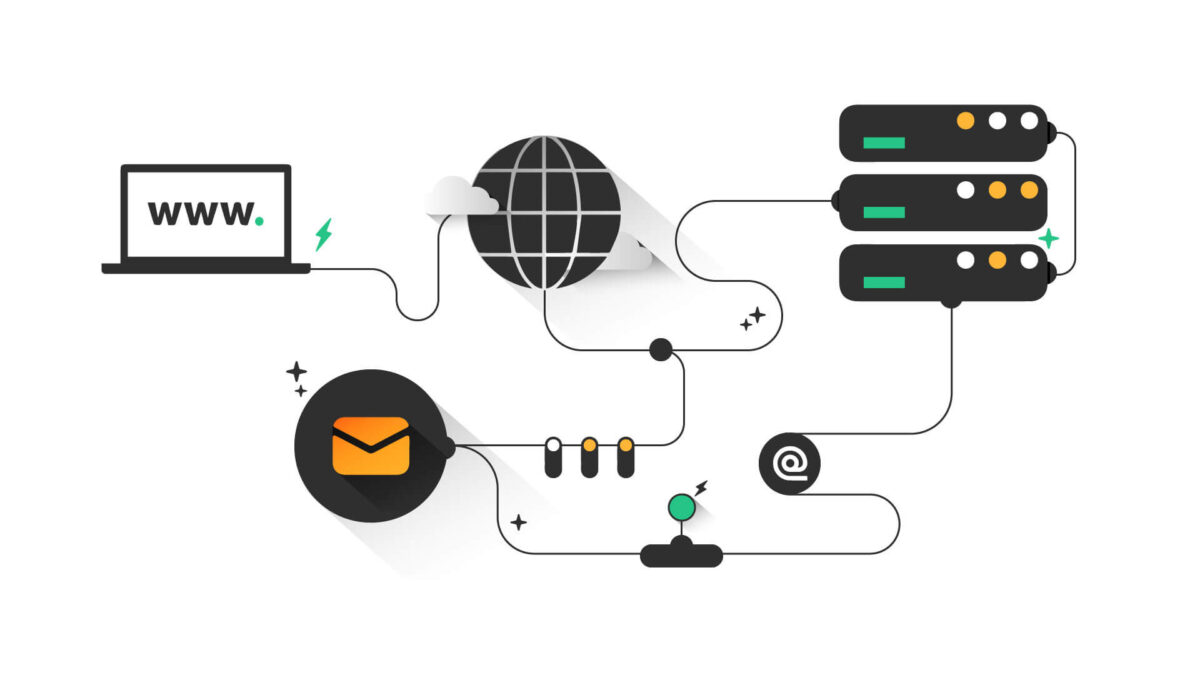
Most WordPress hosts DON’T include email or include shitty email. Here’s the deal:
Hosts WITH Good Email:
- WPX Hosting (unlimited business email)
- Nexcess (unlimited email)
- Some shared hosts (limited, often problematic)
Hosts WITHOUT Email:
- Kinsta (use external service)
- Pressable (use external service)
- Cloudways (use external service)
- WordPress.com (paid email addon available)
Best External Email Solutions:
- Zoho Mail – $1-4/mo/user, budget-friendly (My top choice and recommendation)
- ProtonMail – Privacy-focused, starting free
- Google Workspace – $6/mo/user, professional, reliable
- Microsoft 365 – $6/mo/user, includes Office apps
Personal setup: Zoho Mail and Proton Mail for business email, WPX email for disposable addresses and testing.
Black Friday Strategy (Don’t Get Screwed)
Smart Black Friday Moves:
✅ Compare renewal prices, not just promo prices
✅ Annual plans = biggest discounts (60-75% off common)
✅ Stack deals (hosting discount + free domain + free migration)
✅ Test during the refund period before commitment
✅ Set calendar reminder before renewal (switch if needed)
Avoid These Traps:
❌ Auto-renew at full price (turn OFF auto-renew)
❌ Upsells during checkout (SSL, backups often free elsewhere)
❌ Long-term commitments without testing
❌ “Limited time” pressure (deals return next year)
❌ Cheapest option without reading reviews
My Black Friday Process:
- Identify what I actually need (not want)
- Research real user experiences (Reddit, Facebook groups)
- Compare 3-5 legitimate options
- Calculate true cost (promos + renewals)
- Buy during the peak discount period
- Test immediately during the refund window
- Document renewal date and cancel auto-renewal
Last Black Friday saved $847 on hosting across all sites. Worth the 3 hours of research.
My Honest Conclusions (What I’d Tell My Little Sister)
If you read this far, here’s the no-BS summary:
Starting your first blog?
Grab Bluehost for $2.65/mo during Black Friday. Use it for a year. Learn WordPress. Upgrade when you outgrow it (you will).
Running a small business site?
Get WordPress.com Business ($25/mo) or WPX Hosting Business ($24.99/mo). Both work. Both provide peace of mind. Choose based on whether you want full plugin control (WPX) or ultimate simplicity (WordPress.com).
Managing client sites or running an agency?
Invest in Pressable or Kinsta. Your time is worth more than the price difference. Reliable hosting means fewer 3 AM emergencies.
Building a WooCommerce store?
Don’t cheap out. Get Nexcess or Kinsta. Shared hosting will buckle during sales and cost you money.
Just want my recommendation?
WPX Hosting. I’ve used them since 2016. Fast, reliable, support actually responds in seconds. Not perfect, but damn close for the price.
My Final Thoughts on WordPress Hosting
I’ve been doing this blogging thing for a while. Tried 15+ hosts. Made expensive mistakes. Lost money to downtime. Learned lessons the hard way.
Here’s what matters after all the testing, migrations, and midnight panic attacks:
Hosting is infrastructure, not magic. No host will fix poor content, bad SEO, or lack of promotion. But good hosting provides the stable foundation everything else builds.
Cheap isn’t worth it if it costs you sleep. That $2/month savings disappears the first time your site crashes during a traffic spike.
Expensive isn’t always better. Some $100/month hosts have worse support than $25/month hosts. Test before committing long-term.
Support quality matters more than features. Features are useless if nobody can help you implement them or fix them when they break.
Your first host won’t be your last. Accept this. Growth plan. Document everything. Make migration easier.
Black Friday deals are real, but read the renewal fine print. That $2.65/mo becomes $9.99/mo after year one. Budget accordingly.
Pick a host. Start creating. Upgrade when you need to. Don’t let hosting analysis paralysis stop you from building something.
The best hosting is the one that lets you focus on creating content instead of worrying about servers.
Now go build something worth hosting.
– Mia
FAQs (The Real Ones)
What’s the actual cheapest WordPress hosting that doesn’t suck?
Bluehost at $2.65/mo (Black Friday) or Hostinger at $2.99/mo. Both work fine for beginners and low-traffic sites. You’ll outgrow them, but they’ll get you started without breaking the bank.
Expect to upgrade once you hit 5,000-10,000 monthly visitors or when you start making money from your site.
Can I host WordPress for free?
Technically, yes, through the WordPress.com free plan. But you get:
- WordPress.com subdomain (yoursite.wordpress.com)
- WordPress branding and ads
- No plugins
- No custom themes
- No monetization
It’s like borrowing someone’s car versus owning your own. Fine for testing, horrible for anything serious.
How much should I actually budget for WordPress hosting?
First year: $30-100 total (with Black Friday deals)
After year one: $100-300/year for shared hosting
Growing site: $300-600/year for managed hosting
Business/agency: $600-2,000+/year for premium managed
I spend around $800/year total across Blog Recode and testing sites. Worth every penny to avoid 3 AM server meltdowns.
Is WordPress.com hosting or WordPress.org hosting better?
They’re different things entirely:
WordPress.com = Hosting company (like Bluehost, WPX, etc.)
WordPress.org = Free software you install on any host
WordPress.org doesn’t host anything. It’s the WordPress software. You download it and install it on your chosen host.
WordPress.com is a hosting company that uses WordPress software and manages everything for you.
Both use WordPress. Different approaches. WordPress.com is simpler. Self-hosted (using WordPress.org software on any host) gives more control.
What’s the difference between shared and managed WordPress hosting?
Shared Hosting:
- Your site shares server resources with dozens/hundreds of other sites
- You manage WordPress updates, security, and backups
- Basic support (server-level, not WordPress-specific)
- Cheaper ($3-10/month)
- Works until traffic grows or something breaks
Managed WordPress Hosting:
- Dedicated resources, WordPress-optimized servers
- Host manages updates, security, backups, and caching
- WordPress-expert support
- More expensive ($20-100+/month)
- Built for stability and performance
Analogy: Shared = apartment building with shared utilities. Managed = private apartment with concierge service.
Will changing WordPress hosts hurt my SEO rankings?
Not if you do it correctly. I’ve migrated 30+ sites without losing rankings by:
- Zero downtime migration (keep both hosts live during transition)
- Same URLs/permalink structure (critical)
- Proper 301 redirects (if URLs must change)
- Working SSL certificate (HTTPS maintained)
- Fast DNS propagation (lower TTL beforehand)
Google cares about site speed, uptime, and user experience—not which company hosts your files.
Botch the migration with days of downtime and broken links? Yeah, that’ll hurt rankings. But that’s user experience, not the host change itself.
How do I know when to upgrade my WordPress hosting?
Upgrade when you see these signs:
Performance Issues:
- Site loading is slower than 3 seconds
- Frequent timeouts or errors
- Dashboard painfully slow
Traffic Problems:
- Host threatening suspension for “resource usage”
- Site crashes during traffic spikes
- Visitors are complaining about slowness
Support Failures:
- Support tickets are taking hours/days
- Generic responses that don’t help
- Constant blame-shifting (“it’s your plugins”)
Growth Limits:
- Hit storage/bandwidth caps regularly
- Need features your host doesn’t offer
- Running multiple sites on a single-site plan
Don’t wait until you’re losing money. Upgrade when you see the warning signs, not after disaster strikes.
What happens if my WordPress host goes down?
Immediate Impact:
- The site is inaccessible to visitors
- Lost revenue (e-commerce, especially)
- Email disruption (if host provides email)
- SEO impact if prolonged (rare)
What You Should Do:
- Check the host status page
- Submit a support ticket immediately
- Check UptimeRobot or a monitoring tool
- Update social media if you have an audience expecting access
- Document downtime (screenshot, timestamps)
Good Hosts:
- Notify you proactively
- Resolve within minutes to hours
- Offer SLA credits if applicable
- Communicate transparently
Bad Hosts:
- You discover downtime through lost sales
- No communication
- Days to resolve
- No compensation
This is why I obsess over uptime guarantees and real user experiences. One 6-hour outage during a product launch can cost more than 3 years of premium hosting.
Can I host multiple WordPress sites on one plan?
Shared Hosting: Most “plus” or “premium” plans allow unlimited sites (though resources are still shared)
Managed Hosting: Plan specifies site count:
- WPX Business: 5 sites
- Kinsta Starter: 1 site
- Pressable Personal: 5 sites
- WordPress.com: 1 site per plan
The Reality:
“Unlimited sites” on shared hosting sounds great until you learn they all share the same limited resources. Five active sites on a $5/month plan will perform like garbage.
Better approach: Use managed hosting that specifies site count and provides actual dedicated resources per site.
Do I need WordPress-specific hosting, or is any hosting fine?
Any Hosting Works: WordPress runs on almost any Linux hosting with PHP and MySQL.
WordPress-Specific Hosting Is Better Because:
- Pre-installed WordPress
- Optimized server configurations (PHP version, caching, etc.)
- WordPress-expert support (they understand plugins, themes, etc.)
- Automatic WordPress updates
- Enhanced security (WordPress-specific)
- Staging environments
- Better performance out of the box
When Generic Hosting Is Fine:
- You’re technical and can optimize yourself
- You’re testing or learning
- Budget is extremely tight
- You need hosting for non-WordPress sites too
I started on generic hosting (Bluehost). Moved to WordPress-specific (WPX). The difference in support quality alone made the switch worth it.
Is a website builder included with WordPress hosting?
Depends on the host:
Includes Builder:
- Bluehost (includes builder)
- WordPress.com (built-in block editor + paid premium builder)
- Hostinger (drag-and-drop builder)
- InMotion (BoldGrid included)
Doesn’t Include Builder (Uses WordPress Default):
- WPX Hosting
- Kinsta
- Pressable
- Most managed hosts
Reality Check:
WordPress itself is a content management system with a page builder (Gutenberg). Most people use page builder plugins:
- Elementor (free + paid)
- Beaver Builder (paid)
- Divi (paid)
- WPBakery (paid)
You don’t need hosting to include a builder. Install a free plugin instead.
How much traffic can WordPress hosting actually handle?
Shared Hosting:
- Budget plans: 1K-10K visitors/month before issues
- Higher shared plans: 10K-50K visitors/month
- Beyond that, you’ll face throttling or suspension
Managed WordPress Hosting:
- Entry plans: 25K-100K visitors/month
- Mid-tier: 100K-400K visitors/month
- High-tier: 400K-1M+ visitors/month
Real Variables That Matter:
- Page size and optimization
- Caching implementation
- Image optimization
- Database queries
- Number of plugins
- Traffic patterns (steady vs. spikes)
My 50K monthly visitor site on WPX runs smoothly. Same site on old Bluehost account crashed at 8K monthly visitors. Optimization + host quality = massive difference.
What’s the best WordPress hosting for beginners in 2026?
Absolute Beginners: WordPress.com or Bluehost
Why WordPress.com:
- Zero technical knowledge needed
- Automatic everything (updates, security, backups)
- Can’t break it (limited access prevents disasters)
- Free plan to test
- Upgrade when you need plugins
Why Bluehost:
- Officially recommended by WordPress.org
- One-click WordPress install
- Familiar cPanel interface
- Cheap entry ($2.65/mo Black Friday)
- Free domain for the first year
My Recommendation: Start with the WordPress.com free plan to learn WordPress. Once you need plugins or a custom domain, either upgrade to WordPress.com paid or switch to Bluehost/similar shared hosting.
Don’t overwhelm yourself with premium managed hosting until you understand WordPress basics and have traffic justifying the cost.
Should I use the WordPress hosting my web designer recommends?
Maybe. Ask these questions first:
- Why this specific host? (Generic “it’s good” isn’t an answer)
- Do they have an affiliate relationship? (Not bad, but be aware)
- Have they built sites on this host before?
- What happens if there are hosting issues? (Will they help or blame the host?)
- What’s the renewal price? (Not just promo price)
Red Flags:
- Insists on expensive managed hosting for a 5-page brochure site
- Owns a reseller account (they’re marking up)
- Refuses to give you hosting credentials
- Recommends their “custom hosting solution”
Green Flags:
- Explains reasoning with specifics
- Offers 2-3 options at different price points
- Transparent about affiliate relationships
- Willing to work with your preferred host
- Provides hosting credentials and full access
I’ve seen designers lock clients into terrible hosting because of commission structures. Ask questions. Get hosting in your own name.
P.S. Grab those Black Friday deals before they vanish. Most expire end of November or when they hit quota. Don’t wait until December and pay full price like I did in 2019 (still bitter about that one).
P.P.S. Whatever host you choose, set up UptimeRobot monitoring immediately. Free, takes 5 minutes, saves you from discovering downtime through lost revenue.
P.P.P.S. Seriously, turn off auto-renew. Set calendar reminders. Shop around before renewal. Loyalty doesn’t pay in the hosting industry.
